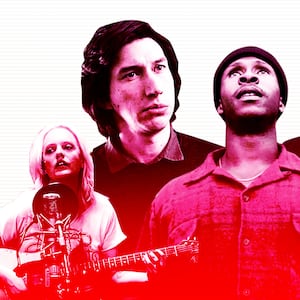There are so many films that came out this decade, and I was only 16 at the beginning of it. What did I know as a junior in high school? I wrote my college entrance essay about the films of Woody Allen, and not compellingly. So, as a mark of having come far, of being more curious about movies—more critical of and in love with them—here are the films of the decade to which I recommend your full attention. These are not purposefully obscure films tailored for cinephiles, but wildly imaginative ones fit to feed any truly hungry mind. Most of these are films that didn’t receive wide distribution, a heavy marketing arm, or major awards, but you should certainly still seek them out. They helped me along in my growth as a watcher and writer, and more importantly, kept me thinking.
In no particular order:
The Films of Patrick Wang
Wang made his money as an economist, but is also a man of the theater, and put his savings into his debut film, In the Family (2011), which he self-distributed, first by four-walling the Quad Cinema in New York in 2012. It’s a beautifully rendered film that rivals Marriage Story’s conception of partnership, parenthood, and the law as a method of communication. His follow-up, The Grief of Others (2015), is also a tragedy with brilliant notes of comedy and confusion, playing out on a patient yet melodic pace. And my favorites, A Bread Factory Parts I and II (2018), are full comedy with high arcs of drama, taking place in and around a community theater run by two older lesbians in upstate New York. All of Wang’s films feature diverse casts, with characters who are never tokenized, but rendered with a full range of imagination.
Tomboy (Dir: Céline Sciamma)
Sciamma began the decade with her second feature, Tomboy, a film that captures the subjectivity of 10-year-old Laure, who discovers the joys of leaving femininity behind by taking on the name Mikäel and presenting as a boy. Tomboy explores the gray area of gender non-conformity, allowing the early stages of Laure/Mikäel’s life to be relatable to both trans and cis people, as well as gay and straight women. It’s a film that’s well ahead of its time in both its flexibility and integrity.
Arabian Nights Vols. I, II, and III (Dir: Miguel Gomes)
In 2015, Gomes released his follow-up to the acclaimed Tabu: an ambitious three-part film fusing an adaptation of One Thousand and One Nights with real stories reported by journalists Gomes sent out to find human-interest stories centering around Portugal’s financial collapse. The result is a transformative take on political cinema that is as richly imagined as it is fervently argued. Gomes himself appears in the film, playing himself as an overwhelmed and cowardly director who hides from his own crew.
Matías Pineiro’s Shakespeare Adaptations
The Argentine director’s modern, unconventional takes on Shakespeare’s comedies, including Viola (based on Twelfth Night), The Princess of France (Love’s Labour’s Lost), and Hermia & Helena (A Midsummer Night’s Dream), are more mysterious and humorous counterparts to Alex Ross Perry’s verbose female-driven dramas. Perfect films for rainy days and bursting, open minds.
Terence Nance’s Radical Visions
Nance’s An Oversimplification of Her Beauty came out in 2012, and it is a fiction-meets-non-fictional take on a major crush combined with a visually dynamic fusion of ideas and reflections on intimacy, patriarchy, and creativity. His recent follow-up, the HBO series Random Acts of Flyness, counts as a film for me—its first season is an expert cohesion of strong ideas and revelatory collaborations with co-writers, producers, and actors all coming from the most exciting scenes in black art this decade has to offer. Kenya (Robinson), Doreen Garner, Junglepussy, and Arthur Jafa all appear.
Pariah (Dir: Dee Rees)
This is still Rees’s best film, and her first, from 2011. It’s a coming-of-age story about a black middle-class lesbian growing up in Fort Greene with a passive dad and aggressive mother who both struggle to understand their daughter’s sexual identity and masc presentation. Adepero Oduye plays Alike with both brightness and soulfulness, and her teenage curiosity is taken seriously both as an expression of her sexuality and creative talents. If you’re looking for great films about youth that go beyond the rubric of self-discovery, this is one to hold close.
Happy Hour (Dir: Ryûsuke Hamaguchi)
I saw the five-plus-hour film at MoMA one afternoon with the same friend I saw all three installments of Arabian Nights with at Lincoln Center. We would give those hours of our lives again and again. Happy Hour is a film for people who don’t only love movies, but people—their failings, flaws, dreams, and wonders. The film delights in the events and details, big and small, that make all the difference for four women in their 30s who are navigating marriage and divorce. Hamaguchi worked together with the actresses—who all make their debuts in this film—to develop the characters and relationships. The result of their labors is a moving and unforgettable meditation on personhood and community.
Midnight in Paris (Dirs: Roni Moore and James Blagden)
Just released in festivals this year with wider distribution coming soon, the documentary follows prom celebrations at a high school in Flint, Michigan. Midnight in Paris doesn’t simply focus on the joy that these teenagers feel apart from the typical depictions of the town, but it delights in their personalities, idiosyncrasies, and contradictions. Moore and Blagden are genuinely interested in these soon-to-graduate students, and ask them about the event that will define their ideas of themselves at a pivotal turning point in their lives. It’s a film of beauty, humor, stunting, and grace—a fiercely self-possessed feature that is as attentive to its subjects as its audience.
Top of the Lake Season 1 (Dir: Jane Campion)
Campion’s New Zealand police procedural stars Elisabeth Moss as the troubled yet determined Robin Griffin, a woman who returns to her small, backwards town to take on seemingly-unending layers of complicity and misogyny. Crucially, Top of the Lake is as suspicious of its heroine and the police system she acts in service of as it is of the surrounding townsfolk, and targets the racism and corruption that festers in New Zealand as the fuel for the violence against women and girls in the region. It’s also a strange show that draws inspiration from Twin Peaks (another TV show that’s really a film, and that had a reboot this decade that you shouldn’t miss), with a compellingly-odd turn by Holly Hunter as a local soothsayer-cum-cult-leader (and American) named GJ.
The Films of Alain Guiraudie
Guiraudie has been making features since the beginning of the previous decade, but this decade introduced two that seem to take on nearly opposite sensibilities: Stranger by the Lake and Staying Vertical. Though, tonally speaking, they are very different films, they each exemplify the themes central to Guiraudie’s unruly artistry: queerness, community, patriarchy, youthful sensuality, complacent old age, aggressive violations, and willful transgressions, with a combination of originality, daring, and curiosity that has become increasingly rare in French cinema. The less I say about either film, the better—find your way to them at your own thrilling risk.



